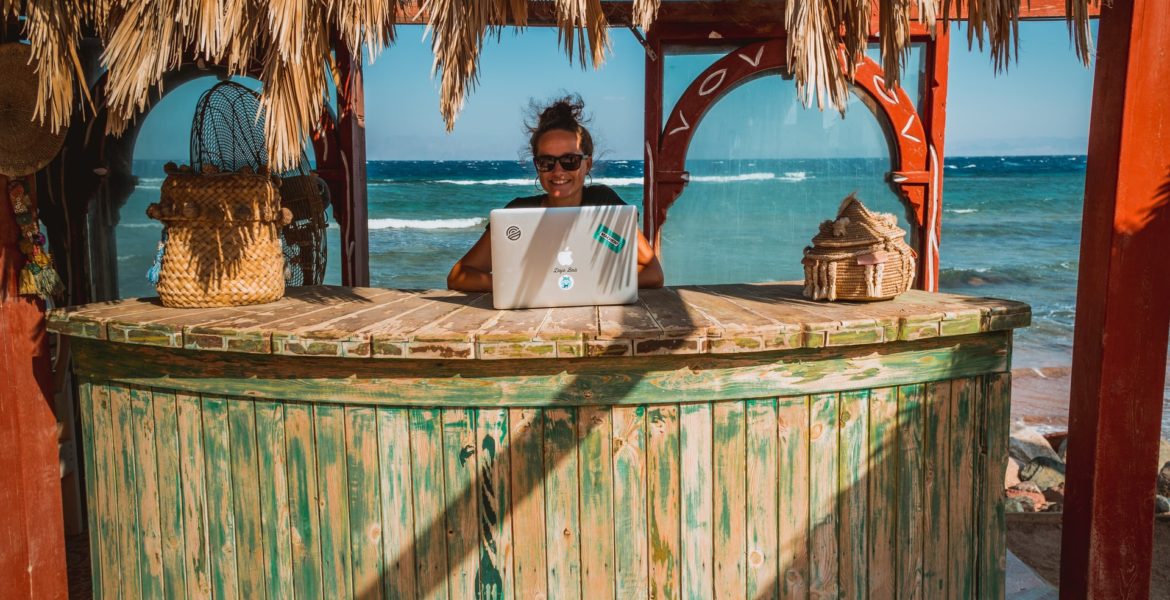With the explosive growth of remote working during the pandemic and many people questioning their lifestyles, the digital nomad movement has become highly attractive for those that can work anywhere and want to experience what the world has to offer!
What is a digital nomad?
We could describe a digital nomad as a person that works remotely for an organisation and moves from place to place favouring a nomadic lifestyle and usually without a fixed home.
Is a remote worker the same as a digital nomad?
Not 100%. Digital nomads are typically remote workers but remote workers aren’t always digital nomads.
A remote worker would most likely stay in one location and work from home or perhaps a co-working space or cafe close by in the town or city where they live.
They may or may not work from a physical office. On the other hand a digital nomad is a remote worker but also travelling whilst working. A digital nomad may spend a few weeks or months in one location before moving onto somewhere new.
When did the digital nomad first appear on the scene?
According to Wikipedia one of the first digital nomads was Steve Roberts who in 1983, a full ten years before the internet arrived, Steve went nomad with his work on a computerised and highly pimped out bicycle.
Steve was a freelance writer and corporate consultant and questioned why he would need to be chained to a desk when he could in fact seek freedom.
Thus the first or maybe one of the first digital nomads was born.
You can read more about Steve Roberts and his interesting story at https://www.fastcompany.com/90683580/steve-roberts-the-original-digital-nomad
How many digital nomads are there worldwide?
There are an estimated 35 million digital nomads around the world and the number is growing fast
Can anyone become a digital nomad?
There is no reason why not. If you do not need to work from any fixed location like a specific office building somewhere and can work from anywhere you have the basics covered.
If you are able to grab your laptop, pick a destination and work from anywhere you are good to go.
Are there disadvantages to being a digital nomad?
As with all things, it’s not always rosy all the time.
There is an inherent level of instability that comes with living the digital nomad lifestyle. Some people love it and for others it’s a bit too much.
While remote working and the digital nomad lifestyle can be very sociable in terms of meeting new people it can also be lonely too.
You arrive in a new city, you don’t know a soul, your friends and families are maybe thousands of kilometres away.
You are therefore forced to make new friends and if you are perhaps a bit shy this could be tricky.
Another danger to the digital nomad lifestyle is the risk of burnout.
With the lines between personal time and work time often blurred it can become too easy to keep working and working and eventually burn out unless you are highly self-disciplined.
It is therefore highly important to build a lifestyle and routine that allows for time off and time out and to actually enjoy the places you are lucky enough to visit.
Lastly, there can be issues with the need to get visas and work permits, language barriers, bureaucracy and so forth to overcome.
What are some popular digital nomad / remote work destinations?
Chiang Mai, Thailand
Canggu, Indonesia
Buenos Aires, Argentina
Ho Chi Minh City, Vietnam
Bangkok, Thailand
Budapest, Hungary
Where do digital nomads typically stay?
Co-living – Probably one of the best accommodation types these days for digital nomads/remote workers is co-living spaces. Co-living offers an instant community, new friends and support when arriving in a brand new city or country. Co-living can be quite affordable but it really depends just like with hotels, the prices, quality and services on offer can vary wildly.
Hotels – hotels tend to have the advantages of good location and the availability of services like room service, daily housekeeping, a bar, restaurant, and maybe an onsite fitness studio or spa. Hotels are perhaps a more expensive option but are on the other hand very flexible, there’s no need to negotiate a lease or make any long term commitments.
Hostels – hostels are somewhere between the purpose-built co-living spaces and hotels in that they tend to be more social, laid back and easy going and usually a bit cheaper than hotels. Hostels can offer cheaper shared dorm-style accommodation and common areas to mingle and meet new people. One of the differences between a hostel and a co-living space would be that hostels are usually geared up for tourists whereas co-living spaces tend to be made for digital nomads who might be sticking around for a while.
Shared housing – another popular form of accommodation is shared housing, typically a house or apartment shared between a group of people where each has their own room and there is a shared kitchen, living room, terrace and often shared bathrooms although en-suite rooms are often available. These types of shared accommodation options are more difficult to find as they are usually between friends or advertised on social media, even Tinder!
Pet & house sitting – a novel accommodation option is house and pet sitting. While flexibility is needed for sure, pet and house sitting can be a great option to get yourself a nice place to stay and enjoy time with animals for a little while. There are even platforms like TrustedHousesitters made just for this.
Conclusion
As the future of work evolves, technology and internet speed and penetration continue to improve the digital nomad movement will continue to gain strength.
Why limit yourself to two weeks of vacation a year when you can kind of vacation all year round, follow the sun, see new places and experience life to the maximum?
There’s a lot to be said about the remote work / digital nomad lifestyle and the only way to know if it’s for you is to go out and try it!


